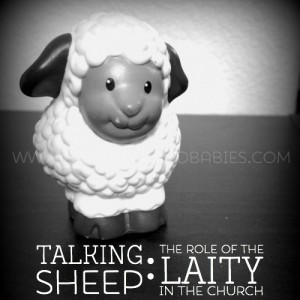Talking Sheep: The Role of Laity in the Church
By Vanessa Rasanen
I’ve never been known for my tact. I rarely say the right thing, and even when I do I usually say it in the completely wrong way. Perhaps it would be better to remedy this problem by keeping my trap shut and learning to be quiet, but instead I’m learning when to speak up and how. This is an important skill to develop, too, as it can benefit our jobs, our families, our communities, and even our church.
Yes, even our church, and even as laity.
We laity are a great asset to our church, though we may not always recognize that. This is perhaps more true for us in the Lutheran church, as we put a great deal of our focus on the office of the keys and the important role of our pastors. We love our pastors. We value them. And rightly so. They are the men called to deliver God’s Word to us, to speak the words of absolution to us, to serve us forgiveness and salvation in the Sacraments. They are the watchdogs for us sheep, the earthly protectors of our souls. Am I getting a bit too dramatic? Meh, too bad. Theirs is a vocation of the utmost importance, and we should revere them and thank them and value them.
But we mustn’t forget our own role here.
Our Role as Laity
We all know we are to listen, to learn, to be served God’s Word and Sacrament through the Divine Service as well as bible studies. At least I hope we all know that. But, we are not to sit idly by, either. We are not to simply listen and accept everything our pastors teach as inerrant truth. We are to test everything – even the words of our beloved pastors – against the Holy Word of God.
Beloved, do not believe every spirit, but test the spirits to see whether they are from God, for many false prophets have gone out into the world.
– 1 John 4:1
Do not quench the Spirit. Do not despise prophecies, but test everything; hold fast what is good.
– 1 Thess 5:19-21
Yes, our pastors are given to us by Christ, called by the Holy Spirit to serve and watch over us. They are also men. Sinners and saints like us, and though we’d like to believe they are immune to the temptations of the world, they simply aren’t. Clergy can, and do, drift away from God’s Word. But we sheep can help our shepherds, through prayer, of course, but also through our voices.
Not About Trivialities, Though
Though this should go without saying, I must make this painfully clear. This is not about griping and groaning about trivialities surrounding our shepherds. This isn’t about our disliking his style or his tone, his facial hair or lack thereof. (Ahem, I have no preference either way regarding facial hair, just so you know.) This has nothing to do with our emotions and whether we like how our pastor and church make us feel. This isn’t a matter of “that hymn should have been played on the organ not the piano” or “that sermon was far too long and my kids got restless… again”. This isn’t about merely airing grievances simply because we don’t particularly like our pastor as a person. Just because you wouldn’t want to share a beer with him doesn’t mean he’s a bad pastor and teaching error.
Whew. Glad we got that out of the way. So, what do we watch out for, then?
Basically, we have a responsibility to hold our clergy to the doctrine of Christ that they are to uphold and teach faithfully. If and when we feel they are drifting away or failing to serve, we must speak up. We are not at the mercy of whatever winds of false doctrine might blow our pastors off course. Though we may often feel that our only option is to pack up and move when false teaching moves in, this is not true. Choosing to silently stick it out does little good, either. Keeping quiet while ignoring the false teaching, accepting it simply as “just the way things are now” may be even worse than leaving, as it signals to our neighbors that we condone what is happening. We do our pastors and our fellow brothers and sisters in Christ a great disservice and injustice if we don’t work to address concerns and issues. If we truly care for our pastors, we will use our voices and our prayers to urge them toward repentance when they err.
The Heterodoxy Among Us
We see this happening currently in the Lutheran Church – Missouri Synod as heterodoxy infiltrates our congregations. I know we laypeople are not blind. We see it happening. We see the message from the pulpits shifting away from Law and Gospel, away from Christ crucified. And it’s been happening for years. There’s the drifting away from biblical liturgy to embrace the feel-good, emotion-driven contemporary worship. There are pastors shluffing off their called office and passing their duties of delivering Word and Sacrament to lay leaders. There are congregations leaving behind plain, scriptural teaching to chase after growth and numbers. There are those, such as the Five Two network, urging us to focus on ourselves as the means by which God saves people rather than sticking with God’s Word and True Sacraments. From open communion to infant communion, well, there are some big problems among us.
We must remember, though, we are not helpless. Yes, we have faithful pastors among us speaking up and speaking out, trying to help their fellow clergy with loving correction, and for them we should be ever grateful for their tireless work. But we can help, and not just with prayers – though it is certainly one of the most powerful tools at our disposal, but with our voices. Have I said voices enough here? I’ll say it again. We need to speak up. And why? Because while our pastors can be reprimanded and disciplined for their speaking out, we are not so easily disregarded by ecclesiastical supervisors in our church body.
But I’m Just A Sheep
I know this is hard. We, after all, have not studied God’s Word as thoroughly as our pastors, and we may feel inadequate or incapable of speaking up or airing our concerns. But this is where technology is surely to our benefit. We are not limited in our resources. Don’t have a book of concord on hand? It’s online! Have a question about our confessions and scripture? We can ask! Even if we find ourselves in an area where pastor after pastor and congregation after congregation is veering away from our confessions and true doctrine, we have incredible access to faithful clergy and faithful teaching via the interwebs and good old phones. There are pastors available to help, to explain, to listen and to guide in how best to approach the situation.
Okay, so voices. We’ve got ’em. Great. But now what? How do we speak up and to whom?
Obviously I don’t expect you to just start ranting and raving about this false teaching and that doctrinal concern just anywhere. Social media is a great tool, but this must start locally, and above all biblically. Yes, I’ll say it. Matthew 18 and the 8th Commandment. These get tossed around a lot, usually incorrectly and defensively, but that doesn’t mean we ignore them either. So where do we start when we have concerns? Simply put we start with our pastors. Ask questions. Always. A simple “I heard this in the sermon, am I understanding it correctly?” can go a long way. Then we talk to our church elders. We call the circuit visitor. We can call our district president or another leader at the synod office. We can even call the seminaries.
None of this does much good if we don’t know what scripture says, so we must study the confessions. Join other laity, locally or online, and discuss them. Learn them, know them. Learn about our synod and read the constitution. Again we should talk to our pastor and ask him questions. We don’t have to wait until we disagree with something he says, either. Pastors love discussing God’s Word, so encourage this by asking, asking, and asking some more. Above and beyond, over and under all of this – pray. Always. For our pastor, for our congregation, for the district, for the synod, for the whole of Christ’s church. Pray.
When we start to feel like we’re just a little ol’ nobody in a small town in the middle of nowhere at a tiny congregation who couldn’t possibly have anything worthwhile to add to the conversation, we must remember a vocal laity is nothing new to our church. Our very confessions were written, presented and defended by laymen. Philip Melancthon compiled and constructed the Augusburg Confession, though he was not clergy. He was like you and me, a regular ol’ sheep. Okay, so not quite like you and me, unless you are a professor of theology. But still, I think you get my point. He wasn’t clergy. He was laity.
And we laity? I think we have a great deal to say, if we’ll just step up and make ourselves heard.
To hear more about this topic, check out Vanessa’s interview on Steadfast Throwdown!



One Comment
Kimberly
Great article! I was just thinking about your sheep analogy. Jesus says that He knows His sheep and His sheep know His voice. If you hear something from a pastor that doesn’t fit with Scripture, check it against Jesus’ words. You may realize that you are, indeed, not hearing the true Shepherd’s voice. Then as you said, raise your voice. Ask questions. Get clarification. And, if necessary, find a faithful undershepherd to receive Christ’s gifts from.